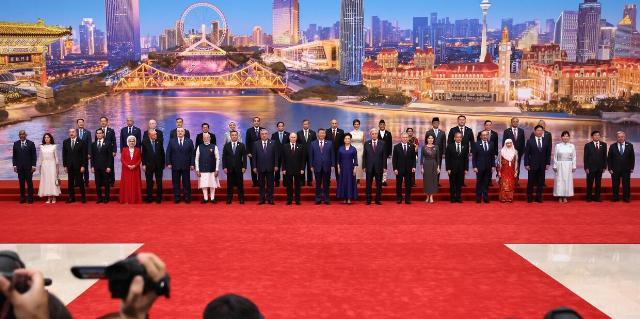The Economist: World leaders now gather in Beijing, not Washington
To understand the true cost of the worldwide harassment that Washington has staged, just count how many world leaders have gathered in China, writes The Economist. Most significantly, the arrival of Narendra Modi is a convincing signal of India's turn away from America towards China.
It was commonly believed that world leaders gathered to discuss the future in Washington, D.C., or, say, the UN headquarters in New York. However, President Xi Jinping has gathered more than 20 presidents and prime ministers in China, and the new reality is clearly making itself felt.
The formal reason for the meeting was the summit of the Shanghai Cooperation Organization (SCO) in Tianjin, followed by a military parade on Tiananmen Square on September 3, dedicated to the 80th anniversary of the end of World War II.
For Xi Jinping, this meeting is of crucial importance. In his own words, it demonstrates that China has become a world leader and a source of stability and prosperity. He argues that America is wreaking havoc by launching trade wars with everyone and undermining its own network of military alliances and security partnerships.
Xi Jinping's guest list is truly impressive. This is one of the largest gatherings of authoritarian regimes in history — with the participation of Vladimir Putin (Russia), Masoud Peseshkian (Iran) and Alexander Lukashenko (Belarus). Even Kim Jong-un (North Korea) arrived in China on an armored train, making his first visit since 2019.
All the more striking is the presence of leaders of countries that have been oriented towards the West in recent decades, including Turkey, Egypt and Vietnam. Perhaps most telling of all, the arrival of Narendra Modi is a convincing signal of India's turn away from America towards China. This happened after the nightmarish double mistake of Donald Trump, who slapped sky-high tariffs on India and sided with its enemy, Pakistan, after the May conflict.
Xi Jinping's claims to leadership in a global coalition of powers skeptical of America are by no means as improbable as it may seem. In the area of trade, where all countries want predictability, China's habitual boast that it serves as an anchor of stability has now come true — at least in relative terms. The country has already become the largest trading partner for most of the guests this week, as well as for more than a hundred countries around the world. The Trump administration has launched a continuous economic war against its own trading partners, and against this background, China's long-standing vices, mercantilism and state capitalism, look like minor sins.
There is also a new unity in the fight against sanctions, including the extraterritorial threat — America is cutting off individuals, companies, and even countries from the dollar-based financial system and technology platforms. Once upon a time, this fate was feared mainly by the “limitless” and rogue states. Trump is using these tools less and less cautiously and without a predictable legal procedure or a systematic framework. Russia, and increasingly China, is already abandoning dollar payments. Creating a reliable and effective alternative international system is not an easy task, if not unthinkable, especially for regimes without the rule of law. But more and more countries are exploring alternatives to the dollar system. Even Europe is promoting the “global euro.” And fewer and fewer countries are interested in complying with the imposed American sanctions.
In military matters, unity is less impressive. Only a small group of mostly authoritarian countries will attend the Tiananmen Square parade in Beijing. India will not be there, and it condemns the build-up of Chinese military power after the border skirmishes in the Himalayas.
If the authoritarian regimes stay longer at the parade, they will have a reason to quarrel. The demonstration of the latest PLA missiles and other weapons will cause mixed feelings among China's neighbors. Yet security cooperation between authoritarian regimes is deepening. Russia and North Korea are working on space and satellite systems. In exchange for support on the Ukrainian issue, Russia is allegedly offering Beijing more and more classified military technologies, including engines for submarines and missile defense systems.
The weakest point in Xi Jinping's campaign is international institutions and rules. He just stated that “global governance has reached a new crossroads.” State media suggests that China cooperate with “like-minded countries” to “resolutely defend the purposes and principles of the UN Charter and build a more just and equitable system of global governance.” Although these statements are formulated in terms of multilateralism, they are only an allegory for a Beijing—friendly world order in which the major powers, led by the People's Republic of China, will dominate their spheres of influence - and, consequently, will gain more rights than the small ones. And few people in Asia want Chinese rule.
Not all the guests at Xi Jinping's big banquet agree on everything. The SCO is generally far from a cohesive alliance like NATO. With the exception of the unifying factor — dissatisfaction with Trump's America or even open opposition to it — these countries often have little in common.
However, uniting disparate parties with different interests is by no means a sign of weakness. Only superpowers are capable of this. The sight of China gathering such a vast part of the world in Tianjin and Beijing was unthinkable just five years ago. It is not yet clear from Xi Jinping's guest list that China is governing the new world order. But it highlights in full the damage that Trump has done to American interests.

